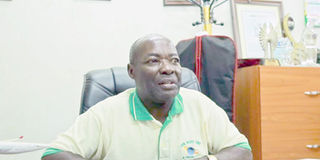Manufacturers demand radical economic reforms

Everest Kayondo, the Kampala City Traders Association chairman. File photo
What you need to know:
- Mr Dicksons Kateshumbwa, the Uganda Revenue Authority (URA) commissioner for domestic taxes, said that whereas they understand the current economic challenges, they expect those with tax obligations to find a way of working on them.
As the country partially opens up businesses that had remained closed for at least the last two months, manufacturers have asked government to institute radical measures to reboot the economy.
Speaking during an online discussion, early this week, Mr Richard Mubiru, the Uganda Manufacturers Association (UMA) economic policy committee board member, said manufacturers are working at an optimum of about 30 per cent, which calls for radical revival measures.
“Covid-19 has made the manufacturing base weaker. We are now operating at only 30 per cent. We have seen the health minister, Jane Ruth Aceng at the forefront of fighting this pandemic. We now need another equivalent of Minister Aceng to lead the economic recovery,” he said during an online discussion organised by lawyer Bernard Oundo under the theme: “The impact of Covid-19 on trade and tax.”
Ms Aceng has since March been at the fore front of the fight against Covid-19, which was first confirmed in Uganda on March 22.
During the discussion, Mr Mubiru cautioned government against financing more administrative units in form of new cities and instead divert the money towards economic recovery, much of which has been damaged by Covid-19.
“I hear government is going to start financing several new cities starting in the new financial year [2020/21].
I propose that that money is sank into the manufacturing sector and the economy at large,” he said, noting there was no need to rush with creating more administrative units at a time when revenue collection and jobs are under threat.
Mr Everest Kayondo, the Kampala City Traders Association chairman, urged government to design policies that will shield people’s businesses from collapse.
He said people have during the Covid-19-related lockdown, spent part of their capital thus many of them will find it hard to pay accumulated bills such as rent, utilities and other tax obligations.
“Just imagine a trader who had capital of let’s say Shs6m before the lockdown, he has not worked for close to three months and yet the rent they pay is a lot. If government does not intervene in this matter, another crisis will emerge,” he said.
However, Mr Moses Kaggwa, the director of economic affairs at the Finance ministry, said government was in high level talks and Cabinet would soon come out with a position in regards to an economic stimulus.
He also said it was not easy for government to intervene some aspects such as rent given the private arrangements between the tenant and the landlord.
“There was no state of emergency. We cannot say landlords should exempt tenants from their rent obligations because they also say, they have bank loans to service, which loans haven’t been waived,” Mr Kaggwa said.
Tax obligation
Mr Dicksons Kateshumbwa, the Uganda Revenue Authority (URA) commissioner for domestic taxes, said that whereas they understand the current economic challenges, they expect those with tax obligations to find a way of working on them.
“We are cognizant of what people are going through but about rental tax, it is our opinion that you self-regulate your business and remit that tax according to how much rent you have collected,” he said.



